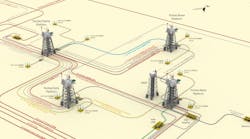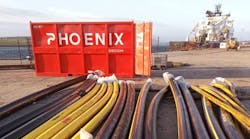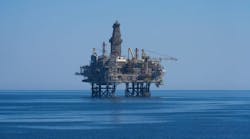Information technology (IT) spending - averaging 2% of revenue - is now the single largest capital expenditure in business today, but it may be even higher in the technology-driven oil and gas industry. Organizations believe these capital costs to be of high value and continue to fund large IT projects.
Some firms today have spent years repeatedly learning the same lessons about the management of their physical knowledge management and intellectual capital assets. With the price of learning in the "E-world" becoming very steep, both in direct expenditures, time, and now possible lost revenue and market share, organizations must find ways to learn from their previous experiences - and quickly!
Firms have several approaches to e-commerce available. Trad-itionally, corporations built their own systems using internal or external resources, or combinations of both. These systems have been managed internally or outsourced. In the past, the service bureaus allowed organizations to use third party software on a per-use basis.
Today, using Internet technologies, the service bureau concept has matured. Application service providers (ASP) allow firms to lease the full capabilities of software instantly and globally, without having to build the extended support capabilities of the past. E-commerce solutions seek to facilitate global supply chain transactions using secure Internet infrastructure such as virtual private networks (VPN), which are rapidly replacing corporate private networks. Additional benefits to participants include reduction in IT overhead required for e-commerce business. Shouldn't vendors take over e-commerce processes and technologies? E-commerce is not a simple task and can be a "bet your company" decision.
Y2K lessons
Y2K was arguably one of the largest IT projects ever brought in on time. IT programs designed originally for Y2K have laid the groundwork for enterprise-wide infrastructure efforts such as e-commerce, and it has set the stage for the transition from private global networks to lower cost virtual private networks (VPN). According to the American Petroleum Institute, some very important lessons learned from the Y2K process across the industry are applicable to broad and deep knowledge management programs:
- Top-level support: There is broad agreement among firms that top-level support was the key to successful implementation of these programs. Good communications and team spirit toward the realization of a broad corporate goal could not have taken place without this leadership. Project oriented leadership from the boardroom followed by cross-disciplinary and cross-industry collaboration paved the way for the successful completion of this project. The petroleum industry should reflect on the other dramatic changes that might be fostered through this specific leadership model. For example, global procurement and sales through e-commerce will demand a knowledgeable management team and board. Long past are the IT programs that can be delegated to the IT department.
- Employee empowerment: Many companies used the Internet to facilitate empowerment, sharing information, and "best practices." The Internet became an important tool for gathering and sharing information, resulting in direct comparisons within an organization and among organizations. As firms become more knowledge and solution driven, and less product and service motivated, the need for empowerment and collaboration will increase.
- Rapid evolution: Another important lesson from Y2K programs was the rapid evolution to modern systems and technologies. Better understanding of IT by management, with periodic review and upgrading of IT systems was an added benefit. The shorter time-to-market for knowledge based solutions will demand aggressive deadline-driven programs. It is no longer acceptable to miss a deadline or redevelop the scope of work near the end of a project. Delays and cost overruns may terminally cripple not just IT departments, but the enterprise as well.
Many companies now feel that it is very important to be, as a minimum, a "fast follower" on the technology curve. The Y2K infrastructure remediation effort has resulted in consolidation of technology, saving the industry costs in training and maintenance while reducing complexity. It was also recognized that customization of software packages is often not necessary to support business requirements. Organizations now better understand of their "knowledge infrastructure," having developed better testing metrics.
Mission critical vendors
Many companies had no idea of the large number of vendors identified as "mission critical" during the remediation process. Reduction of this large number was seen as an opportunity for future strategic source programs, through which additional efficiencies and cost savings could be obtained. An "interdependence" among industry players was recognized and valuable lessons were learned about the reliability and dependability of vendors. In other industries business process consolidation and supplier reductions are credited with significant savings in the procurement process.
Firms that take advantage of process changes before engaging vendors will accrue those savings to themselves. Moreover, this new baseline will enhance the firm's negotiating position with potential e-commerce partners.
Management leadership, employee empowerment, a better understanding of IT and the connected enterprise, an up-to-date technology base, combined with a better understanding of the supply chain and interdependencies, all pave the way for industry electronic commerce on a scale never seen before in the petroleum industry.
These are lessons the industry paid handsomely to learn. Shareholder value will be realized if firms capitalize on the knowledge gained during Y2K initiatives and apply these process and technology gains to e-commerce programs. The challenge is clearly before us. The risks are few and the benefits large.
Scott M. Shemwell
David Sims
Netigy Corporation
Houston
This page reflects viewpoints on the political, economic, cultural, technological, and environmental issues that shape the future of the petroleum industry. Offshore Magazine invites you to share your thoughts. Send your manuscript to Beyond the Horizon, Offshore Magazine, Box 1941, Houston, TX 77251 USA. Manuscripts will not be returned.



